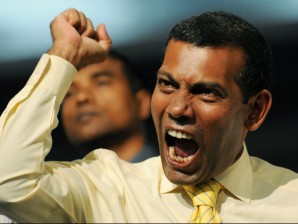
In this file photograph taken on February 9, 2012, former Maldives President Mohamed Nasheed gestures during a party meeting in Male. The first democratically elected president in the Maldives goes on trial on October 1, 2012, on abuse of power charges, seven months after being toppled in what he calls a “coup d’etat” in the tourist paradise. AFP/Ishara S. Kodikara
COLOMBO — The first democratically elected president in the Maldives goes on trial Monday on abuse of power charges, seven months after being toppled in what he calls a “coup d’etat” in the tourist paradise.
Former leader Mohamed Nasheed’s honeymoon with multi-party democracy ended in February when he was forced out in a police mutiny after he detained the chief criminal court judge on corruption allegations.
Once an Amnesty International prisoner of conscience, Nasheed, 45, now faces up to three years in jail or banishment to a remote islet in the archipelago where tourists pay up to $12,500 a day for Robinson Crusoe-style holidays.
The former leader insists he was ousted in a “coup” involving his former deputy, Mohamed Waheed, who has since become president.
“The coup has not yet been completed,” Nasheed told AFP at the weekend after his Maldivian Democratic Party (MDP) staged a mass rally on the tiny capital island Male on Friday to denounce the charges against him.
Nasheed in January had criminal court judge Abdullah Mohamed arrested over corruption charges – a move that triggered weeks of opposition-led protests and his eventual downfall on February 7 after police mutinied.
Conviction as a result of his trial could disqualify Nasheed from contesting the next presidential elections – something he charged the new government is keen to to do.
But, he said: “People will not allow the regime to steal the next election. A free and fair election is our over-arching goal.”
Pro-Western Nasheed, who won global attention as a campaigner against global warming, said he had “no chance of a fair trial, particularly in a case as political as this”.
The man who brought democratic reforms to the nation of 330,000 Sunni Muslims said he believed the nation’s judiciary was still loyal to his arch-foe Maumoon Abdul Gayoom.
Nasheed formed his MDP in exile but returned home to a hero’s welcome, sweeping 54 percent of the vote in the 2008 elections that ended Gayoom’s 30-year autocratic rule.
“You can bring down a dictator in a day, but it can take years to stamp out the remnants of his dictatorship,” Nasheed said, referring to Gayoom’s defeat in the nation’s first multi-party election.
Gayoom ruled the islands between 1978 and 2008 and repeatedly threw Nasheed in jail over a period of six years.
The new government denies Nasheed’s Monday trial is politically motivated, but accuses him of exceeding his powers when in office. It has vowed to maintain law and order on the tiny capital island of 130,000 people.
The government will not allow any opposition violence, a presidential spokesman said, and denied opposition accusations that the trial was politically motivated.
Apart from the criminal case, Nasheed also faces two defamation suits filed against him by Police Commissioner Abdullah Riyaz and by Defence Minister Mohamed Nazim.
Soon after Nasheed’s downfall, the government got an arrest warrant for him on charges of abuse of power, but it was never executed due to international pressure.
He accuses the new administration of being influenced by Islamic extremists, a charge denied by President Waheed.
Nasheed became a darling of the global green lobby in the footsteps of his predecessor Gayoom, who was the first to raise fears of the Maldives being swamped by rising sea waters due to global warming.
In 2009, Nasheed turned environmental stuntman when he held the world’s first underwater cabinet meeting to press nations to cap carbon emissions that cause global warming and threaten low-lying nations such as the Maldives.
But his four-year tenure was also marked by problems of unemployment, a lack of housing in the overcrowded capital, widespread drug abuse and a rise in Islamic fundamentalism-fuelled discontent.